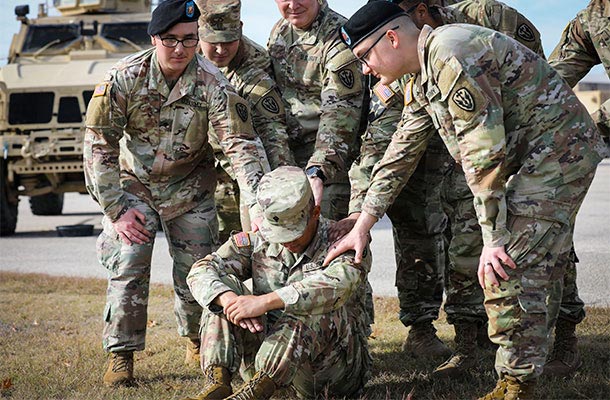Suicide Prevention in the Military: Recognizing Signs and Providing Support
9/10/2024

Opening up about suicide is tough, but it’s vitally important, especially when it comes to our military community. Military personnel are at a higher risk of suicide than people not in the military. Several factors contribute to this heightened risk: the extreme pressures of military duties, the hardship of being away from family, and the challenges and traumas encountered in combat. By fostering open discussions about suicide, we can help each other spot potential warning signs and take timely action, a crucial step in preventing suicide.
Common Signs of Distress
Watch for these common signs that indicate someone may be struggling:
- noticeable mood swings
- withdrawal from colleagues, friends, and family
- increased use of drugs or alcohol
- expressions of hopelessness
- insomnia
- changes in appetite
How You Can Help
If you notice signs that a loved one or colleague is suffering, offer support and help them connect to invaluable resources. Remember, open, non-judgmental communication helps reduce the stigma around mental health. Take advantage of one or more of the mental health resources the military provides specifically designed to assist service members who may be considering self-harm or suicide. These resources can offer immediate support, counseling, and intervention to prevent tragic outcomes.
- Military Crisis Line: One of the most critical resources, the Military Crisis Line, also called the Veterans Crisis Line, is available 24/7 for servicemembers, veterans, and their families. By dialing 988, then pressing 1, or texting 838255, they can speak to trained professionals who specialize in helping those experiencing a mental health crisis. The service is confidential and available worldwide.
- Veterans Affairs (VA) Mental Health Services: The VA offers a wide range of mental health services, including counseling, therapy, and suicide prevention programs. Veterans can access these services at VA Medical Centers, outpatient clinics, and through the VA’s Vet Center program, which provides community-based counseling for combat veterans and their families. Learn more at the VA mental health website.
- Chaplain Services: Military chaplains offer spiritual and emotional support and are trained to assist those experiencing mental distress, including suicidal thoughts. Since they operate within a confidential framework, chaplains provide a safe space for service members to discuss their struggles without fear of career repercussions.
- Behavioral Health Clinics on Bases: Many military installations have behavioral health clinics staffed with psychologists, counselors, and social workers specializing in military mental health. Service members can access these clinics for mental health assessments, counseling, and treatment for conditions like depression, PTSD, and anxiety.
- Military OneSource: This resource offers 24/7 confidential support and counseling services to active-duty members, their families, and veterans. It provides free short-term counseling, referrals, and other mental health and well-being resources. Learn more at the Military OneSource website.
- Command Support and Peer Assistance Programs: Many units have specific programs aimed at suicide prevention and mental health awareness, such as the Air Force’s “Wingman” program and the Army’s “Buddy” system. These programs encourage service members to look out for one another and offer support when someone is struggling.
Facing mental health challenges can be frightening. But these resources are designed to ensure that you, your friends and family, and your military coworkers have access to help when it is needed most. Using these resources can save lives and provide the necessary care and intervention when it matters. You’ll be glad you did.
Photo by Lance Sgt. Melissa Lessard
Uniformed Services Benefit Association® (USBA®) is a nonprofit Association that provides group life insurance, health insurance supplements, and other products and services to military personnel, Federal employees, National Guard and Reserve members, Veterans and their families.
Click here to subscribe to USBA’s Blog.
Follow us on social media @USBAInsurance
Follow us on social media @USBAInsurance